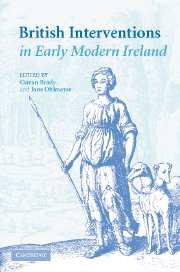Book contents
- Frontmatter
- Contents
- Notes on contributors
- Acknowledgements
- Aidan Clarke: an appreciation
- Conventions
- List of abbreviations
- 1 Making good: New perspectives on the English in early modern Ireland
- 2 The attainder of Shane O'Neill, Sir Henry Sidney and the problems of Tudor state-building in Ireland
- 3 Dynamics of regional development: processes of assimilation and division in the marchland of south-east Ulster in late medieval and early modern Ireland
- 4 The ‘common good’ and the university in an age of confessional conflict
- 5 The construction of argument: Henry Fitzsimon, John Rider and religious controversy in Dublin, 1599–1614
- 6 The Bible and the bawn: an Ulster planter inventorised
- 7 ‘That Bugbear Arminianism’: Archbishop Laud and Trinity College, Dublin
- 8 The Irish peers, political power and parliament, 1640–1641
- 9 The Irish elections of 1640–1641
- 10 Catholic Confederates and the constitutional relationship between Ireland and England, 1641–1649
- 11 Protestant churchmen and the Confederate Wars
- 12 The crisis of the Spanish and the Stuart monarchies in the mid-seventeenth century: local problems or global problems?
- 13 Settlement, transplantation and expulsion: a comparative study of the placement of peoples
- 14 Interests in Ireland: the ‘fanatic zeal and irregular ambition’ of Richard Lawrence
- 15 Temple's fate: reading The Irish Rebellion in late seventeenth-century Ireland
- 16 Conquest versus consent as the basis of the English title to Ireland in William Molyneux's Case of Ireland … Stated (1698)
- Principal publications of Aidan Clarke
- Index
14 - Interests in Ireland: the ‘fanatic zeal and irregular ambition’ of Richard Lawrence
Published online by Cambridge University Press: 31 July 2009
- Frontmatter
- Contents
- Notes on contributors
- Acknowledgements
- Aidan Clarke: an appreciation
- Conventions
- List of abbreviations
- 1 Making good: New perspectives on the English in early modern Ireland
- 2 The attainder of Shane O'Neill, Sir Henry Sidney and the problems of Tudor state-building in Ireland
- 3 Dynamics of regional development: processes of assimilation and division in the marchland of south-east Ulster in late medieval and early modern Ireland
- 4 The ‘common good’ and the university in an age of confessional conflict
- 5 The construction of argument: Henry Fitzsimon, John Rider and religious controversy in Dublin, 1599–1614
- 6 The Bible and the bawn: an Ulster planter inventorised
- 7 ‘That Bugbear Arminianism’: Archbishop Laud and Trinity College, Dublin
- 8 The Irish peers, political power and parliament, 1640–1641
- 9 The Irish elections of 1640–1641
- 10 Catholic Confederates and the constitutional relationship between Ireland and England, 1641–1649
- 11 Protestant churchmen and the Confederate Wars
- 12 The crisis of the Spanish and the Stuart monarchies in the mid-seventeenth century: local problems or global problems?
- 13 Settlement, transplantation and expulsion: a comparative study of the placement of peoples
- 14 Interests in Ireland: the ‘fanatic zeal and irregular ambition’ of Richard Lawrence
- 15 Temple's fate: reading The Irish Rebellion in late seventeenth-century Ireland
- 16 Conquest versus consent as the basis of the English title to Ireland in William Molyneux's Case of Ireland … Stated (1698)
- Principal publications of Aidan Clarke
- Index
Summary
Richard Lawrence is chiefly remembered as the pamphleteer who entered the lists against Vincent Gookin in 1655. His role in defending the scheme to transplant many of the defeated Irish west of the River Shannon is well known. Rather than revisit one controversial episode, it is his entire career in Ireland which will be considered, and particularly Lawrence's reflections on it. Lawrence, having arrived with the Cromwellian army in 1649, stayed until he died in 1684. During those thirty-five years he shifted from championing the English to advancing the locals' interest in Ireland. So much was proclaimed in the titles of his books. The brace from the Interregnum were entitled The Interest of England and England's Great Interest in the Well Planting of Ireland. In contrast, the compendium which was published in 1682 was The Interest of Ireland in its Trade and Wealth Stated. This was a personal journey made by numerous other settlers from England, Wales and Scotland in the sixteenth and seventeenth centuries. Apart from its intrinsic interest, Lawrence's altered perspective shows something of the rapid physical and cultural transformations around him, especially in Dublin from the mid-1650s.
The value of Lawrence lay less in his originality than as a conductor of what was in the air. Anxieties which he voiced often had long histories. In several cases – dislike of luxury and absenteeism – they would concern commentators well into the eighteenth century.
- Type
- Chapter
- Information
- British Interventions in Early Modern Ireland , pp. 299 - 314Publisher: Cambridge University PressPrint publication year: 2005
- 1
- Cited by

